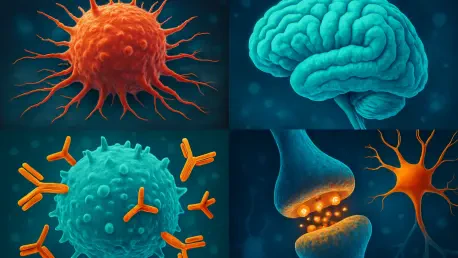In a remarkable stride forward for cancer treatment, researchers have uncovered a profound connection between cancer cells, the nervous system, and immune responses, shedding light on why some patients resist immunotherapy. This emerging field, known as cancer neuroscience, explores how tumors interact with nerves, leading to chronic inflammation and immune exhaustion, particularly in cancers like squamous cell carcinoma, melanoma, and stomach cancer. A groundbreaking study from a leading cancer research center reveals that cancer cells can damage the protective layers around nerves, triggering a cascade of harmful effects that hinder the body’s ability to fight the disease. This discovery not only deepens the understanding of tumor behavior but also points to innovative pathways for enhancing treatment efficacy. By delving into these complex interactions, the research opens a new frontier in oncology, promising to transform the approach to stubborn, resistant cancers through targeted interventions.
Exploring Tumor-Nerve Interactions
The intricate relationship between tumors and the nervous system forms the core of this pioneering research. Specifically, the process known as perineural invasion, where cancer cells infiltrate the spaces surrounding nerves, has been identified as a critical factor. This invasion damages the myelin sheaths, the protective coverings of nerve fibers, sparking an inflammatory response as the body attempts to repair the injury. However, the persistent presence of the tumor ensures that this healing process never completes, trapping the system in a chronic cycle of inflammation. Such ongoing damage not only weakens neuronal health but also profoundly impacts the surrounding immune environment. The study highlights that this effect is not a general consequence of cancer but a direct result of nerve injury caused by tumor infiltration, emphasizing the need to focus on these specific interactions to unravel the mechanisms behind treatment resistance.
Beyond the immediate damage to nerves, the chronic inflammation resulting from perineural invasion creates a hostile microenvironment that exhausts the immune system. This exhaustion manifests as a suppressed immune response, where the body’s defenses are unable to effectively target cancer cells. Consequently, therapies like anti-PD-1 immunotherapy, which rely on a robust immune response, often fail in patients exhibiting these characteristics. The research underscores that understanding this feedback loop—where nerve injury fuels inflammation, which in turn fosters immune suppression—is vital for developing strategies to break the cycle. By pinpointing the unique role of nerve damage in this process, the findings suggest that addressing neuronal health could be a linchpin in overcoming barriers to successful cancer treatment, offering a fresh perspective on tackling resistance.
Targeting Pathways for Better Outcomes
A significant takeaway from this research is the identification of actionable targets within the signaling pathways that mediate chronic inflammation and immune suppression. Through advanced techniques like genetic analysis, bioinformatics, and spatial profiling, researchers have mapped out key points in the nerve injury pathway where intervention could make a difference. The study suggests that disrupting these pathways might reverse immune exhaustion, thereby enhancing the effectiveness of immunotherapy. This approach represents a shift from broad-spectrum treatments to precision strategies that address the specific dynamics between tumors, nerves, and immune responses. Such targeted interventions hold the potential to improve outcomes for patients who currently face limited success with existing therapies, marking a pivotal advancement in personalized cancer care.
Moreover, the broader implications of these findings point to a transformative trend in oncology through the integration of neuroscience. As part of a larger collaborative effort across multiple institutions, this research aligns with programs dedicated to exploring neurobiology and its intersections with cancer throughout a patient’s treatment journey. The focus on tumor-neuro-immune interactions reveals novel mechanisms that could redefine clinical practice. By targeting the pathways linked to cancer-induced nerve injury, there is an opportunity to mitigate resistance and unlock the full potential of immunotherapies. This multi-faceted approach not only addresses immediate therapeutic challenges but also sets the stage for long-term innovations, as researchers continue to probe the intricate connections between the nervous system and cancer progression, paving the way for more effective solutions.
Future Horizons in Cancer Treatment
Reflecting on the strides made, the research illuminated how cancer-induced nerve damage contributes to immune exhaustion and therapy resistance through a relentless inflammatory cycle. This exploration of perineural invasion as a driving force behind these challenges provided a clear focus for intervention. Looking ahead, the next steps involve accelerating the development of therapies that target the identified pathways, with an emphasis on clinical trials to test their efficacy. Collaborations across global research institutions should be prioritized to refine these approaches and integrate neuroscience more deeply into oncology. Additionally, investment in advanced analytical tools will be crucial to uncover further insights into tumor-nerve dynamics. By building on these findings, the medical community can work toward innovative treatments that address the root causes of resistance, ultimately improving survival rates and quality of life for patients battling complex cancers.









